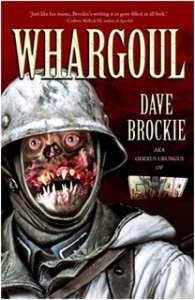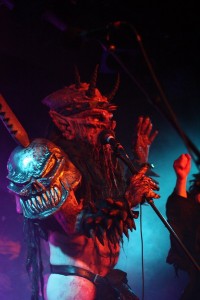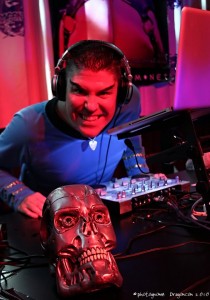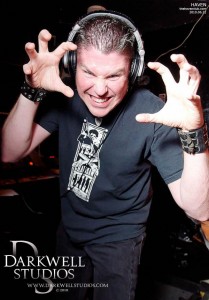By Jonathan Williams
Best known as the monster mask-wearing singer for metal band Slipknot, as well as the singer for the more hard rock oriented Stone Sour, Corey Taylor has recently shown his more studious side. First he was a guest lecturer at Oxford University this past June, then he released his first book, Seven Deadly Sins, in July. For the past couple of weeks he’s been on a solo tour that features spoken word and acoustic performances, as well as more intimate interaction with his fans than anything he’s done previously. With the tour continuing through Dec. 13, Taylor took a moment to talk to Wrestling with Pop Culture about the shows, the book and the wrestling-style promo he did to promote the tour.
So you’re about a week or so into your first spoken word and solo acoustic tour. How’s it going so far?
It’s going really well. Unless I say something stupid onstage, like make fun of the Pope or something, I think we’re doing alright.
This is obviously not your first time performing without your Slipknot mask, but it is a more revealing and intimate look at who you are as a performer than anything you’ve done previously. That being said, what can people expect from these shows?
 I wasn’t really sure how the audience would respond to it and they have responded so wonderfully. Basically the show is me running my mouth for the first hour, then I take a quick pee break, then I play for, like, an hour and a half. It’s anywhere from two-and-a-half to three hours every night. It’s been a lot of fun. I come out and I rant in the vein of whatever chapter I’m going to read from that night, so every night is different. Then I read from the book, we do a Q&A, then we play some songs. It’s been really fun for me specifically because I love to have one foot in the structured side and one foot in the extemporaneous side. I love being spontaneous and if something’s feeling a certain way you just run with that. The audience has been so into it it’s really been awesome. Basically it’s like if [Henry] Rollins, [George] Carlin and Dave Grohl were the same person. That’s really been the response we’ve gotten.
I wasn’t really sure how the audience would respond to it and they have responded so wonderfully. Basically the show is me running my mouth for the first hour, then I take a quick pee break, then I play for, like, an hour and a half. It’s anywhere from two-and-a-half to three hours every night. It’s been a lot of fun. I come out and I rant in the vein of whatever chapter I’m going to read from that night, so every night is different. Then I read from the book, we do a Q&A, then we play some songs. It’s been really fun for me specifically because I love to have one foot in the structured side and one foot in the extemporaneous side. I love being spontaneous and if something’s feeling a certain way you just run with that. The audience has been so into it it’s really been awesome. Basically it’s like if [Henry] Rollins, [George] Carlin and Dave Grohl were the same person. That’s really been the response we’ve gotten.
I just got a copy of the book a few days ago, so I haven’t had a chance to spend much time with it yet.
Well, I apologize in advance.
I’m sure it’s not that bad. Tell me a little bit about the concept behind the book and why you decided to write a book.
I’ve been threatening to write a book for a long time. It’s one of those things I’ve always wanted to do since I was a kid. I’ve been a voracious reader since I was young and once I developed a taste for writing I knew that someday, if I ever got the chance, I’d want to write a book. When the chance came along, I jumped for it.
The concept of the book was originally just going to be about philosophy and me taking the piss out of philosophy in general. Luckily my agent talked me out of that and was like, “Dude, that will be 5,000 pages, it’ll weigh as much as a Volkswagen Beetle, we can’t do that.” I was like, “What do you suggest?” We kind of shot some ideas back and forth and he’s actually the one that said, “Why don’t you write about the Seven Deadly Sins?” At first, I was like, “That’s kind of a hackneyed premise when you get down to it. Why don’t I write it from the standpoint that they’re not sins, they’re just part of being human?” The more I thought about it, the more I truly believed that. So I basically used the book to make that argument that the Seven Deadly Sins are not sins at all; they’re part of being human and making mistakes. They can lead to sin, but the emotion itself is not the sin. I think in this modern literal world, we break it down into what is literal. There’s no room for esoteric mistakes anymore, so for me it made more sense to make that argument and balance it with stories from when I was growing up or being on the road and whatnot and basically say, “Look, I went through all of these ‘sins’ and I came out the other side and I’m a better husband, better father, better person for it. So how can you call that sin?” The reaction has actually been really good.
 Did you have to do a lot of re-reading of The Canterbury Tales, John Milton and all that?
Did you have to do a lot of re-reading of The Canterbury Tales, John Milton and all that?
I read that stuff a long time ago. I studied it in school and read it on my own and whatnot, but I didn’t want to get too ensconced in the original material. I really wanted to make it feel a little more fresh. That’s one of the reasons I left out the Seven Golden Virtues. I wanted to concentrate on the sins themselves and really pick them apart like that. I knew that if I got too deep into the original material, I would start to quote too much. I brushed up on it briefly, but for the most part I just kind of ran with it. I did my best to make sure everything I was writing was as original as I could make it.
Was the spoken word tour part of the plan the entire time or did that come about after you finished the book?
That came out of nowhere. It came from two things, honestly. It came from my speaking engagement at Oxford and the two gigs I booked after the book had come out in England. I was doing a signing tour in England anyway and I thought, “Let’s just go into a club and do a show.” Those two shows were so much fun that I was like, “We’ve got to do this in the States. There’s no way I would not want to do this in the States.”
The Oxford engagement was really where I came up with the idea for the Q&A. At the end of my speech, I could tell no one wanted to leave. So I was like, “We’ve got a little more time, you got any questions you want to ask me?” It was so much fun. With every question, I had a weird little story I could tell. So it was really cool to be able to kind of incorporate those two ideas into the American tour. One of the reasons the show is different every night is because not only is my rant at the beginning a little different, but the questions allow me to tell different stories and really break it up and give something to people so that specific show is completely different.
How did the Oxford engagement come about?
They had been trying to get me to do that for about three years. I was always on the road or in the studio and I just never had any time to go and do it. So I was really lucky that they came to me every year for three years and finally that last year I was actually going to be in London anyway for the Kerrang Awards and for Slipknot rehearsals. So I was like, “Absolutely! Let’s do it. If I don’t do it this year I’m never going to get to do it.” I’m so glad I did. It was just fantastic and so much fun.
The tour announcement video you did featured you cutting a wrestling promo for a fictitious promotion called the IBWF (I Be Wrestling Federation). What was the inspiration for that?
We were sitting at my kitchen table trying to think of a different way to promote the tour. I hate doing the same crap over and over. It drives me nuts after a while, so I wanted to do something different. And I went, “Oh my God. A wrestling promo!” Everyone around me was like, “That’s amazing!” It was right around the time that the Halloween shops had sprouted up everywhere, so I was able to find everything I needed in one day. We went back to the house, I put on my ridiculous outfit and we shot it in 10, 15 minutes. It was great. I knew people would take that and run with it. The weirder I get, the more the fans are into it for some damn reason. It was a perfect way to set the tour up. Plus it gave us a chance to put Chicken Cow Cow back out there. Search for Chicken Cow Cow on YouTube and it’s the first thing that comes up. It’s my little dance remix thing that I do with my keyboard.
Were there certain wrestlers you drew from stylistically when cutting that promo?
Obviously there’s Hulk Hogan in there somewhere. I’ve been a wrestling fan since I was a kid. If you embrace it for what it is, which is entertainment, I have no illusions about the fact of if it’s real or not. But I know it’s physically taxing and it takes great skill to make it look good and no skill to make it look crappy. I know the people who rise to the top are the best in the business and it’s almost a metaphor for the music business. People come and go, but legends stay forever. My all-time favorite wrestler is Stone Cold, but I also love the Rock, Triple H, Shawn Michaels and the wrestlers I grew up with, which is Hogan, Ricky “The Dragon” Steamboat, Tito Santana, Andre [the Giant], even “Hacksaw” Jim Duggan. I got to meet him and Brutus “The Barber” Beefcake and I was, like, freaking out. I was losing my shit, I was like, “Oh my God. You guys are awesome.” I’m still a fan.
Do you still follow it much these days?
I try to. But it’s like getting to watch football on Sundays, it’s hit or miss. I know the Rock is back. I was actually at the Anaheim show when he came out and they announced him as the guest host for WrestleMania this year. I lost it. I jumped up out of my chair and was losing my mind, so much so that I scared an entire family sitting behind me. They were like, “Excuse me, sir. Could you just sit down? I’ve got kids here and they’re trying to see.” I was like, “No. I won’t sit down. I don’t care. It’s the Rock. Get out of my face.” Then I sat down and was like, “Sorry, I’m just really hopped up on sugar.”
Were you there as a guest of WWE or as a paying fan?
I was there as a fan. It’s very rare that I go to anything as a guest. I’m just like everybody else, I buy my ticket. There’s not a lot of shows that I go to, whether it’s wrestling or music or whatnot. But at the end of the day, I can buy a ticket like anybody else. With the rare exception of if I’m friends with the band I’m going to see, then I’ll call them. But that’s really because I want to hang out with them, catch up with them, see if they’re doing OK and whatnot. But when it’s band’s like Van Halen or Nine Inch Nails or whatever, I buy my tickets, I go and I sit, watch the show, love the show and if I don’t get close seats, so be it.
Now that you’ve done spoken words, acoustic performances and various other musical projects, do you think you’ll be branching out into more mediums in the future?
Maybe. People ask me all the time if I want to get into acting and whatnot. I don’t want to be the star of a movie or anything, but I would love to do some supporting stuff and just be the guy that walks by in the background and you’re like, “Did I just see Corey Taylor in that movie?” I want to be the body on CSI so bad I can’t even breathe.
Me and Clown [Slipknot’s Shawn Crahan] are actually starting our own film production company where we’re going to start making crazy, twisted, weird movies. Movies that everyone can enjoy, but also movies that look great, feel great, that are different. We want to make movies that look fantastic, but also scare the crap out of you or make you think. So that’s something we’re working on right now.
For more information, go to www.thecoreytaylor.com.
















